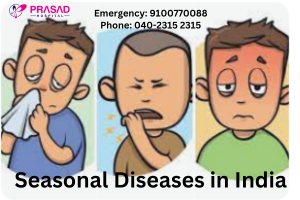Seasonal diseases in India pose a significant health challenge due to the country’s diverse climatic conditions. With distinct seasons like winter, monsoon, and summer, the environmental changes bring about shifts in disease patterns, necessitating proactive measures to combat them effectively.
During the winter months, respiratory illnesses such as influenza, common colds, and pneumonia are rampant. The drop in temperature coupled with increased air pollution exacerbates respiratory conditions, making individuals more susceptible to infections. Recognizing the symptoms of these diseases, such as coughing, sneezing, fever, and body aches, is crucial for early intervention and treatment. Practicing good hygiene, staying warm, and getting vaccinated against influenza can significantly reduce the risk of contracting winter diseases.
Monsoon season brings its own set of health concerns, primarily waterborne diseases like cholera, typhoid, and leptospirosis. Heavy rainfall leads to water stagnation, creating breeding grounds for disease-causing pathogens. Contaminated water sources and improper sanitation further contribute to the spread of these illnesses. People should be vigilant about drinking clean water, maintaining personal hygiene, and avoiding street food during this time to prevent monsoon-related diseases.
As the temperature rises during summer, heat-related illnesses become prevalent across the country. Conditions like heatstroke, dehydration, and skin infections are common during this season. Prolonged exposure to high temperatures, coupled with inadequate hydration and poor ventilation, can lead to heat-related emergencies. It’s essential to stay hydrated, avoid direct sunlight during peak hours, and wear loose, breathable clothing to mitigate the risk of heat-related illnesses.
Apart from these seasonal diseases, vector-borne illnesses like dengue, malaria, and chikungunya pose a year-round threat in many parts of India. Mosquito breeding peaks during the monsoon season, but the risk persists throughout the year in tropical regions. Implementing mosquito control measures, using insect repellents, and sleeping under mosquito nets are crucial preventive strategies to combat these diseases.
Public awareness campaigns and community health initiatives play a vital role in educating people about the symptoms, causes, and preventive measures for seasonal diseases. Government health agencies, NGOs, and healthcare providers collaborate to disseminate information and offer medical support in vulnerable communities.
In conclusion, understanding the dynamics of seasonal diseases in India is essential for effective prevention and management. By staying informed, adopting preventive measures, and seeking timely medical care, individuals can safeguard their health and well-being throughout the year, regardless of the prevailing season.

